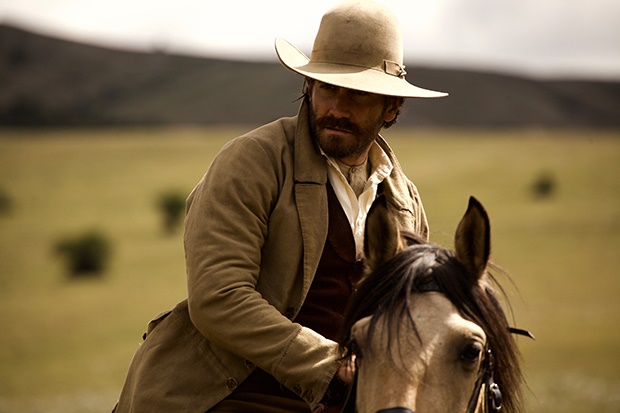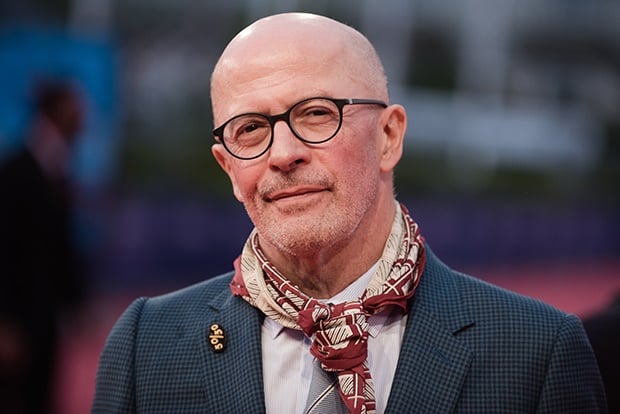French director Jacques Audiard talks about the challenges of re-imagining not only the Western genre but also the inner-self of everyone who finds themselves wandering blissfully lost in their own story.
Cape Town - From acclaimed director Jacques Audiard, 66, and based on the novel by Patrick deWitt, comes The Sisters Brothers - a re-imagining of the cinematic Western as a dangerous, witty, and emotionally cathartic exploration of what it means to be a man.
It is 1851, and Charlie and Eli Sisters (Joaquin Phoenix and John C. Reilly) are both brothers and assassins, boys grown to men in a savage and hostile world.
They have blood on their hands: that of criminals, that of innocents…and they know no state of existence other than being gunmen. The older of the two, introspective Eli (Reilly) rides hard with his younger sibling yet dares to dream of a normal life. The younger of the two, hard-drinking Charlie (Phoenix) has taken charge with gusto as lead man on the duo’s assignments. Each increasingly questions, and quibbles with, the other’s methods.
The Sisters brothers find themselves on a journey through the Northwest, bringing them to the mountains of Oregon, a dangerous brothel in the small town of Mayfield, and eventually, the Gold Rush land of California — a journey that will test the deadly family ties that bind. But, can it also be the path to rediscovering what remains of their humanity?
The Sisters Brothers also stars Jake Gyllenhaal as learned scout John Morris and Riz Ahmed as fugitive chemist Hermann Kermit Warm.
Below a Q&A with French director Jacques Audiard on the film:
How did this project come about?
Under unusual circumstances, for me. In this case, the idea came not from myself but from John C. Reilly and the producer Alison Dickey, who is John’s wife. We all met in 2012 at the Toronto Film Festival, where my film Rust and Bone was being screened. They asked me to read Patrick deWitt’s book because they had obtained the rights. I did read it, and it got me enthusiastic.
I didn’t realise it at the time, but this was the first instance where someone recommended material that I responded to. Up until then, I was always working from my own ideas or a novel I had read — so, generating my own movies. I should add that, left to my own devices, I would never have happened on deWitt’s book or would have thought to try making a Western. I was already at work writing Dheepan, which was my next film.
You weren’t harbouring a desire to make an authentic Western movie?
Frankly, no. I haven’t felt a connection with the genre. The ones that had interested me the most were the Western “in decline,” more or less post-modern works; for example, Arthur Penn’s Little Big Man and The Missouri Breaks.
Among the more classical Westerns, it would be the same, as I was more interested in movies about the twilight of the West, ones that critique…perhaps, the genre itself: Rio Bravo, The Man Who Shot Liberty Valance, Cheyenne Autumn. Dramatically, the Western is very linear and without suspense, although epic. In my work, I feel I have been drawn to stories that are more fraught…
(COWBOY MORRIS: Jake Gyllenhaal as John Morris in The Sisters Brothers. Photo: Supplied)
You gravitate to very personal intimate stories.
Yes, and the book had the strong theme of brotherhood, so I guess that drew me in. It’s hard to say. The element of fraternity is a motif common enough to Westerns, linked to the legacy of violence dating back to one’s ancestors and how to manage that. With that, you’re never far from The Man Who Shot Liberty Valance, which is about no more and no less than arriving at a state of democracy. All the vestigial violence, how is one going to quell that moving forward?
So, for me, what distinguishes The Sisters Brothers is that this mythology has to be addressed — and as a conversation between two brothers. This is a Western taking place before Freudian analysis: two brothers talk and talk, finally saying things they’ve never said before. Normally, that might happen in a living room and on a couch; here, it’s happening on horseback.
The Sisters brothers are active talkers and ruthless killers, and it is that unexpected mixture which made telling this story so attractive. Also appealing was how dark we could make it — like a fairy tale of two children lost in the forest but moving forward towards…something.
Because there had to be a worthwhile conflict for the two brothers together, one of the key changes we made in the adaptation was expanding the characters of Warm and Morris, the idealist and the dandy. They were in the book, but as very simple funny characters. In the movie, coming up against the brothers’ mentality and brutality, they take stands for a more modern world and a more Utopian outlook.
A lot of Westerns are about morality, from at least one of the characters’ perspective; in The Sisters Brothers, there manifests a clear moral horizon that draws one brother.
Yes, Eli’s point of view is shifting along the way. The movie’s objective is expressed through the character of Warm, whose convictions start to seduce people — one after another. That was a big part of writing the adaptation. We took real-life inspiration from the Saint-Simonians who migrated across the United States in the 19th century, European pre-socialists who were going to establish a new society.
So, the movie was never going to be a simple meditation on the genre?
That comes into it, but when you’re making a movie you’re in your own life and cognizant of images you see, books you read, conversations you have, everyday epiphanies…
The question arises: In this day and age what is a Western, exactly? We can identify two camps. There are ones that are classically made like Appaloosa and Open Range that carry reverence for archetypes, landscapes, etc. The other way is Quentin Tarantino’s approach: irony, more contemporary ultra-violence. For The Sisters Brothers it seems to me that we went a third route: quieting down the Western.
(ACCLAIMED DIRECTOR: Jacques Audiard attends the premiere for The Sister Brothers the 44th Deauville American Film Festival. Photo by Francois G. Durand/WireImage)
Your films have increasingly explored the need for reinvention of the self and being a stranger to oneself and others.
And for myself, with each movie it’s vital to find the means of placing yourself in a situation that engages you in a different way, has you work in a different way; that’s not always a given. My previous film, Dheepan was making a movie with nonprofessional actors, from elsewhere, speaking Tamil. In a way, The Sisters Brothers doubled the challenge: filming a Western in English, in Spain and Romania, with American and British actors.
You have dedicated the film to your own brother, who disappeared at age 25. When remembering a brother, does this right away take one back to childhood?
In my case, it does. For a family of two brothers, when one disappears, the other becomes the only son and the eldest. All the responsibility that was his now falls to you; it’s like an inheritance. You realise how you were comfortable in taking shelter behind him. In an instant, you have all of the inconveniences of the first generation and are without advantages. And you are alone.
The Sisters Brothers is now showing on DStv.
REVIEW: This robust cowboy flick will surprise you with its big heart and dark sense of humour




 Publications
Publications
 Partners
Partners












